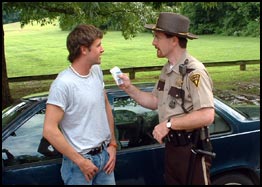Supreme
Court
Okays
Arrest
of
All
Occupants
in
Cars
Where
Unclaimed
Drugs
Are
Found
12/19/03
Better a hundred innocent people get hauled off in handcuffs than one drug law violator go free. That is the essence of the Supreme Court's ruling in the case of Maryland v. Pringle, handed down Monday. The Supreme Court held that Baltimore County police acted properly four years ago when they arrested all three occupants of a car after the officers discovered drugs and cash inside and everyone denied owning them. The ruling reversed the decision of Maryland's highest court, which last year threw out the conviction of the one man eventually tried in the case, Jerome Pringle. The Maryland court held that Pringle's arrest was unconstitutional because police had no reason to believe he was individually involved in a crime. "A policy of arresting everyone until somebody confesses is not constitutionally unacceptable," that court held.
The justices were faced with the task of applying the notion of probable cause to a situation where either innocent people would be arrested in the search for a guilty party or a guilty person would go free for fear of violating the rights of others. The court held that police may now constitutionally arrest the innocent. Friends of a tough line on law enforcement hailed the ruling. "With this decision, the court has reaffirmed the necessary flexibility of the probable cause standard, which allows police to deal appropriately with the varying circumstances associated with encounters with criminals on the street," said Charles Hobson, an attorney with the Criminal Justice Legal Foundation, a Sacramento-based nonprofit that filed a friend-of-the-court brief urging the justices to uphold Pringle's arrest. "The Maryland court's holding had assumed that among the three passengers in the car, only one could possibly be the drug dealer. But the Supreme Court determined that there was nothing unreasonable about the police suspecting that any one or all three were involved, and it was certainly not unconstitutional to arrest them based upon that suspicion," he added. Defense attorneys and civil liberties groups were decidedly less enthused. "The Supreme Court should not have taken this case," said Little Rock attorney John Wesley Hall, Jr. (http://www.fourthamendment.com), a specialist in Fourth Amendment law and board member of the National Association of Criminal Defense Lawyers. "They should have just let the Maryland decision stand and not worried about it," he told DRCNet. "The Maryland appeals court decision said that if there wasn't sufficient evidence to convict Pringle of a crime, there wasn't sufficient evidence to arrest him. It's like the days of the Warren Burger court," Hall said. "Every time the state loses, the court grants certiorari. The idea is to just arrest everyone in the car and get them to start blaming someone else." Still, according to Hall, the Supreme Court's decision does not break new ground as much as it codifies existing police practices. "Down here, in every case in which I have been involved with similar facts, they just arrest everyone," he said. "To me, the fact that the Supreme Court even heard this case says this is just another typical political decision by the court designed to help the cops." Tracy Maclin, a Boston University law professor who wrote a friend-of-the-court brief on Pringle's behalf, was less sanguine than Hall. "It's going to be easier to arrest people, and there is... nothing in this opinion to cabin this rationale," Maclin told the Washington Post Tuesday. "If someone has 20 friends over, and a cop comes to the house and finds contraband under the couch pillow, what's to prevent the police from arresting everyone in the house?" For Steven Silverman, executive director of the Flex Your Rights Foundation (http://www.flexyourrights.org), an organization devoted to teaching Americans how to effectively exercise their constitutional rights, the court's Pringle decision highlights the need for citizens to protect themselves from police abuses. Pringle and friends, who consented to a search of their vehicle, could have avoided all the trouble they found themselves in if they had exercised their rights, Silverman said. "This case highlights the role of consent searches in legitimizing subsequent police actions," he told DRCNet. "Far too frequently, Supreme Court rulings which appear hostile to civil liberties begin when a criminal suspect consents to a police search request. Had the defendant known of his Fourth Amendment right to refuse police searches, the evidence would not have been discovered, and the defendant and his companions would not have been arrested. More importantly, the Supreme Court would have been denied another opportunity to further expand the 'Drug War Exception' to the Bill of Rights." The case arose on the night of August 7, 1999, when a Baltimore County police officer stopped the vehicle in which Pringle was riding. After receiving consent to search the vehicle, the officer found $763 in cash in the glove compartment and five bags of crack cocaine stuffed behind an armrest. The officer arrested all three occupants after none would admit to being in possession of the drugs. Pringle admitted the next day that the contraband was his, and is currently serving a 10-year sentence for possession of cocaine with intent to distribute. For citizens, there are two bottom lines here: First, exercise your rights. Do not consent to suspicionless searches. Second, if you're carrying contraband and get caught, be prepared to take the rap. Don't send your friends to jail, too. Visit http://www.supremecourtus.gov/opinions/03pdf/02-809.pdf to read the opinion in Maryland v. Pringle online.
|

